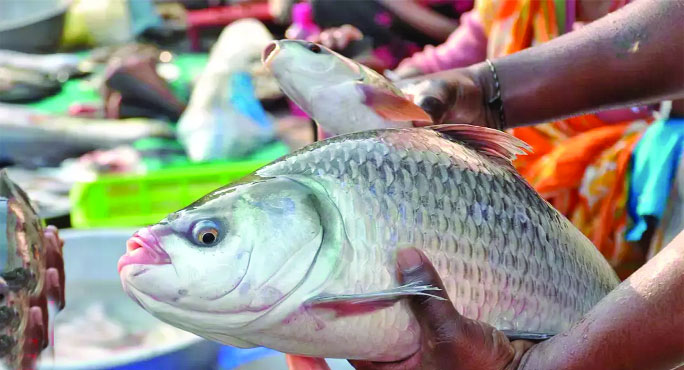Bangladesh exports Tk 4790cr fish in ‘22
Zarif Mahmud: Despite the financial recession in the world market, the country’s income from exporting 69.88 thousand metric tons of fish and fish products in the financial year 2022-23 has been Tk 4,790.33 crore. According to the latest information of the Food and Agriculture Organization of the United Nations, Bangladesh is one of the three countries in the world that have shown success in fish production despite the corona epidemic.
According to a global report titled ‘The State of World Fisheries and Aquaculture 2022’ by the Food and Agriculture Organization of the United Nations (FAO), Bangladesh ranks third in the world (ranked fifth for six years) in farmed fish production. It is considered a unique achievement of the fisheries sector by the stakeholders.
Also, Bangladesh now ranks third in the world in freshwater fish production. It is in the first position in the production of hilsa (currently the total production of hilsa is 5.71 lakh metric tons).
According to the Department of Fisheries, about 70% of the fish products exported from Bangladesh are value added products. IQF, Cooked, Fish Fillet value added fish products are usually exported from Bangladesh.
Bangladesh mainly exports different species of prawns including lump, bagda, deer, fresh water fish such as Rui, Katla, Mrigel, Id, Tengra, Boal, Pabda, Koi etc. and marine fish such as Vetki, Datina, Rupchanda, Katal fish, Crab. Dried fish, fish scales and shrimp shells are also exported. Crabs and crabs extracted from natural sources are being exported abroad.
Fisheries sector stakeholders say that ensuring the production of safe and quality fish and fish products is one of the mandates of the Fisheries Department. To this end, Good Fisheries Practices and Hazard Analysis and Critical Control Point (HACCP) management systems have been implemented at all levels of shrimp production in the country. Ensuring safe fish production is facilitated by implementation of Fish Feed and Feed Acts and Regulations, Fish Hatchery Acts and Regulations. As part of the implementation of the traceability system for exported fish and fish products, the registration of about 207,000 shrimp farms and 9,651 commercial fish farms has been completed so far. E-traceability program is being piloted by forming 300 clusters of small and medium shrimp farmers. A ‘Standard Operating Procedure Manual’ has been formulated to ensure safe and quality shrimp production in line with international market demand.
The ‘Aquaculture Medicinal Products Control Guidelines’ have been formulated and are being implemented at the field level to control the use of drugs in aquaculture. Fish and Fishery Products Official Control Protocol is being followed for effective inspection of all establishments involved in fish farming and processing, from fish hatcheries. As per the National Reduce Control Plan (NRCP) since 2008, samples of fish and shrimp are being collected and tested by the Department of Fisheries to ensure safe production of fish and fish products.
Bangladesh’s fish and fish products are exported to more than 52 countries. The Netherlands, Belgium, Germany, United Kingdom, China, India, France, America, Japan and Russia are among these countries. The Netherlands is the top importer of Bangladeshi fish and fish products.
According to the Department of Fisheries, the total fish production in the fiscal year 2021-22 was 47.59 lakh metric tons, which is 85.68 percent more than the total production of the fiscal year 2007-08 (25.63 million metric tons) and 55.42 percent more than the total production of the fiscal year 2010-11 (30.62 million metric tons). Per capita daily fish consumption has increased to 67.80 grams against demand (60 grams/day/capita). Fisheries sub-sector contributes 2.43 percent of the country’s total GDP and 22.14 percent of the agricultural GDP. About 19.5 million or more than 12 percent of the total population of the country, including about 1.4 million women, are directly or indirectly engaged in various activities of this sector and are making a living.
In the development of the green economy, initiatives have been taken to explore, conserve and sustainably harvest conventional and non-conventional fish resources in the sea. Formulation of short, medium and long-term marine fisheries development strategies and updating them in coordination with the SDGs. Meanwhile, Marine Fisheries Act 2020 and Marine Fisheries Rules 2022 have been formulated. 10,000 artisanal fishing boats and five commercial fishing boats have been brought under the technology-based vessel monitoring system to strengthen monitoring, control and surveillance in the country’s sea limits.
Fisheries and Livestock Minister S. M. Rezaul Karim told Daily Industry that the contribution of the fisheries sector in meeting the food and nutritional needs of the people of the country is recognized by all. Along with this, the fisheries sector is making a great contribution to the creation of employment and poverty alleviation of a large population.
The minister said that the importance of fish in meeting the food and nutritional needs of the growing population of the country, the need to conserve fisheries resources, the use of modern technology in the fisheries sector, the contribution of the fisheries sector to the national economy, increasing export earnings, poverty alleviation through employment generation and the role of the fisheries sector in the socio-economic development of the country is celebrated every year in an effort to make the people more involved and aware of the National Fisheries Week. This time National Fisheries Week 2023 is being celebrated from July 24 to July 30 with the theme of ‘Safe fish country, build smart Bangladesh’.
President Joe Biden tests positive for COVID-19 while campaigning in Las Vegas, has ‘mild symptoms’
International Desk: President Joe Biden tested positive for COVID-19 while traveling Wedne…








